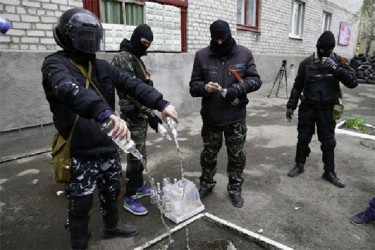KIEV/SLAVIANSK, Ukraine (Reuters) – Armed separatists took control of a city in eastern Ukraine yesterday and Kiev prepared troops to tackle what it called an “act of aggression by Russia”, pushing the conflict between the neighbours into a dangerous new phase.

Pro-Russian activists carrying automatic weapons seized government buildings in Slaviansk, a town about 150 km (90 miles) from the Russian border, and set up barricades on the outskirts of the city.
In Kramatorsk, some 80 km to the north, gunmen seized the police station after a shootout with police, a Reuters witness said.
Government buildings in several other towns in the Donetsk and Luhansk regions were attacked in what Washington said were moves reminiscent of the events that preceded Russia’s annexation of Ukraine’s Crimean peninsula.
“We are very concerned by the concerted campaign we see under way in eastern Ukraine today by pro-Russian separatists, apparently with support from Russia,” said Laura Lucas Magnuson, spokeswoman for the White House National Security Council.
“We saw similar so-called protest activities in Crimea before Russia’s purported annexation.
“We call on President (Vladimir) Putin and his government to cease all efforts to destabilize Ukraine, and we caution against further military intervention.”
The West accuses Russia of destabilising the region as a pretext to potentially sending in troops to protect the local Russian-speaking population, as it did in Crimea. NATO says Russian armed forces are massing on Ukraine’s eastern border, while Moscow says they are on normal manoeuvres.
Any escalation would increase the risk of a “gas war” that could disrupt energy supplies across Europe.
Ukrainian Interior Minister Arsen Avakov called the attacks in the east “a display of external aggression from Russia.”
“Units of the interior and defence ministries are implementing an operational response plan,” he added.
Russian Foreign Minister Sergei Lavrov said Ukraine was “demonstrating its inability to take responsibility for the fate of the country” and warned that any use of force against Russian speakers “would undermine the potential for cooperation” including talks due to be held on Thursday between Russia, Ukraine, the United States and the European Union.
In Slaviansk, at least 20 men with pistols and automatic weapons took over the police station and a security service headquarters before spreading out through the city.
Officials said the militants, wearing mismatched combat fatigues, balaclavas and bulletproof vests, seized hundreds of pistols from weapons stores in the buildings.
The city’s mayor said she supported the protesters and more than a thousand people gathered in front of the police station, chanting: “Moscow, Crimea, Russia!”
They cheered as the Ukrainian flag was replaced with the blue, black and red of the self-declared Donetsk Republic.
“We want to join Russia. We would be very grateful if Russia helps us,” said a gunman who gave his name as Alexander, wearing camouflage fatigues and a black balaclava mask.
“We will stand until victory. Honestly, it’s not scary for me to die for freedom.”
On a road into Slaviansk, men with automatic rifles set up a roadblock and checked vehicles entering the city.
It was unclear if local law enforcement agencies were taking orders from Kiev any more after the regional police chief quit.
Kostyantyn Pozhydayev came out to speak to pro-Russian protesters at his offices in the regional capital, Donetsk, and told them he was stepping down “to avoid bloodshed”.
Ukrainian commentator Sergei Leshchenko said the burst of activity by pro-Russian groups was an attempt by the Kremlin to secure a strong negotiating position before the international talks about Ukraine in Geneva next Thursday.
Russia is expected to argue at the talks for a revamp of Ukraine’s constitution to give a large degree of autonomy to eastern Ukraine, something Kiev and its Western backers reject.
“Russia will come to the talks with the position that ‘Donetsk and several neighbouring regions are already ours – now let’s talk about federalisation’,” said Leshchenko, a commentator with the Ukrainska Pravda newspaper.
With the crisis in Ukraine still unresolved, the gas dispute threatens to affect millions of people across Europe.
A large proportion of the natural gas that EU states buy from Russia is pumped via Ukrainian territory, so if Russia makes good on a threat to cut off Ukraine for non-payment of its bills, customers further west will have supplies disrupted.
Russia is demanding Kiev pay a much higher price for its gas, and settle unpaid bills. Russian state-owned gas giant Gazprom and its Ukrainian counterpart, Naftogaz, are in talks, but the chances of an agreement are slim.
“I would say we are coming nearer to a solution of the situation, but one in the direction that is bad for Ukraine,” Ukrainian Energy Minister Yuri Prodan said in an interview with the German newspaper Boersenzeitung.
“We are probably steering towards Russia turning off its gas provision,” he was quoted as saying.
That raised the spectre of a repeat of past “gas wars”, when Ukraine’s gas was cut off with a knock-on effect on supplies to EU states.





